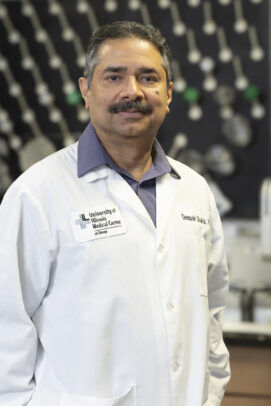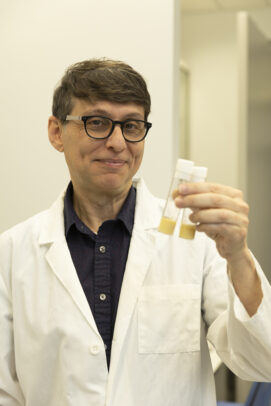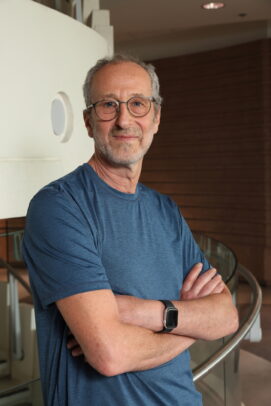Three scientists named fellows of American Association for the Advancement of Science



University of Illinois Chicago faculty members Nemat Oliver Keyhani, Alexander Mankin and Deepak Shukla were named fellows of the American Association for the Advancement of Science, one of the most prestigious honors in the field of research.
Keyhani, Liberal Arts and Sciences distinguished chair in the natural sciences and professor of biological sciences, was recognized for his work on fungal-host interactions, particularly in insects and plants. Mankin, distinguished professor in the Department of Pharmaceutical Sciences and the Center for Biomolecular Sciences, studies ribosomes and antibiotics.
Shukla, the Marion H. Schenk Esq. Professor in Ophthalmology for Research of the Aging Eye and professor of microbiology and immunology in the College of Medicine, studies how herpesvirus infects cells. He also develops new therapies to prevent blindness from the disease.
The three join 500 other scientists, engineers and innovators elected in the 2023 class of fellows, who will be recognized at a ceremony in September.
Keyhani joined the College of Liberal Arts and Sciences faculty last fall. He researches pathogenic and mutualistic relationships between fungi and insects, research that has implications for pest control, tree health and understanding the evolution of social insects.
One study in his laboratory looked at ambrosia beetles, which have a mutual association with fungal species that they carry in tiny pouches near their head and “farm” for food. Recently, the lab focused on an invasive species of the beetle whose fungal partner causes laurel wilt disease, an infection that has killed over 500 million trees in the southeastern U.S. over the last 25 years. Keyhani’s group found that the foreign fungus can jump to native insects, producing new ecological concerns.
“Now that it can be carried by indigenous beetles, the prediction would be that the range is going to expand even farther,” Keyhani said.
Before joining UIC, Keyhani spent 23 years at the University of Florida. He received his education at Johns Hopkins University and the University of Pennsylvania. Keyhani said the fellowship was an honor, but bittersweet; Wayne Nicholson, the colleague who nominated him for the election, died last summer.
“He was an amazing microbiologist and astrobiologist and made a number of seminal contributions to these fields,” Keyhani said. “I never really had an opportunity to thank him. But it’s a very nice honor to be recognized for my work, and I’m delighted.”
Mankin has spent over 30 years at UIC, where his laboratory with Nora Vázquez-Laslop has studied the ribosome, the cellular machinery that makes proteins and is a frequent target for antibiotic drugs. Their research uses molecular biology techniques to illuminate the mechanisms of antibiotics, how bacteria develop resistance to these drugs and what these processes reveal about normal ribosome function.
“Many things about antibiotics are misunderstood,” Mankin said. “With the new tools, we learn how antibiotics work and build the foundation for making them better drugs.”
In the last decade, Mankin has explored ribosome engineering, a branch of synthetic biology where scientists modify ribosome structure and function to produce new protein synthesis capabilities. In recent papers, he has written about promising new antibiotics found in honeybees and fruit flies, as well as the possibility that the ribosome effects of these drugs may also make them useful in treating various diseases.
Mankin received the Paul R. Dawson Biotechnology Award from the American Association of Colleges of Pharmacy in 2013 and became a UIC Distinguished Professor in 2014. He credits UIC with supporting his work throughout his career, particularly the faculty, colleagues and students of the Center for Biomolecular Sciences in the College of Pharmacy.
“Community is super important, and people are very collegial,” Mankin said. “It’s exciting to deal with people who are often smarter and more knowledgeable than you are. That keeps you alive and keeps you going.”
Shukla studies herpes simplex viruses, one of the most common infections in the world. In severe infections, the virus can penetrate cells in the eye and brain, causing blindness and encephalitis.
Shukla uses microbiology and immunology tools to determine how the virus establishes itself in cells, which gives clues on how to prevent the further spread of infection. His research has led to multiple promising treatments for herpesvirus as well as a new drug-delivery system that allows existing therapies to be applied directly to the eye, avoiding systemic side effects.
His group continues to look for treatments that not only protect patients from blindness but eliminate the virus from their bodies.
“It’s a major puzzle that I’ve been trying to solve for the last 25 years,” Shukla said. “But I think we are getting close.”
Earlier this week, Shukla received the 2023 Inventor of the Year award from the UIC Office of Technology Management. He credits the UIC community with supporting his innovative work.
“Everybody’s very friendly and very collaborative, and we have mutual respect for each other,” Shukla said. “It’s an environment that allows you to grow academically, scientifically and socially.”
Categories
Faculty, Featured Academic Research, Health Sciences Colleges, Research, UIC today
Topics
